
With updates happening now and then, it is so important that businesses are sure about investing their time and money on the right things.
When it comes to marketing, you cannot ignore a tool as valuable as email marketing!
You might be wondering why you should prioritize email marketing when there are so many other options for reaching your target audience. Is it really worth it?
To answer this in one word, I would say YES!
The result you get from email marketing is much more than just getting your message into your subscribers’ inboxes.
We understand that there is a lot of buzz surrounding email marketing and its benefits, but to consider it, you need a valid email marketing stat.
So, in this piece of writing, we will see what the email marketing stats suggest.
NOTE: You do not have to start from the beginning (unless you wish to go with the flow), feel free to pick any sub headline right from the bottom or middle, it’s up to you. Just make sure you read everything covered here.
Now, let us get started.
Half the World Population are Email Users!
In November of this past year, the world hit a new population benchmark of 8 billion people globally!!!
And around 4.3 billion people use email, which means that email is used as a communication tool by more than half of the world’s population.
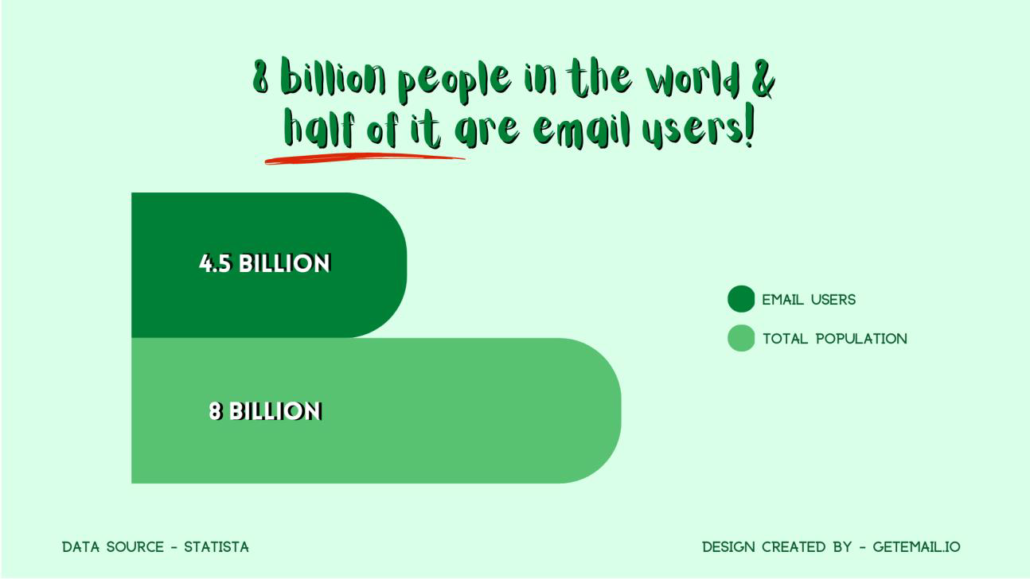
And that is not all. This number is expected to rise to 4.6 billion within the next two years.
Therefore, it is imperative that companies and email marketers are well prepared to capitalize on this media; the best way to do this is to begin constructing an email list.
So, the next question is how to get an email address?
If you are not sure about how to find anyone’s email address to build your email list, an email search tool like GetEmail.io is an ideal choice.
With this tool handy, you can get an email address from multiple platforms or medium, say LinkedIn, Salesforce, Gmail, Outlook, Websites, etc.
As you read further, you will find this tip elaborated in just a few sections away, stay tuned.
Now, let us look at a few more stats to get a deep understanding of all that is about email marketing and ways to make the best out of it.
- According to research conducted by Get Response in 2019, it was discovered that more than 22 percent of all email campaigns get opened within the very first hour of being sent to the users.
And with each hour, the chances of getting more email opens reduces.
- 63% of emails are now opened on a mobile device.
- The return on investment in email marketing is 4200% as for every 1 dollar you spend you get 42 dollars.
What do these metrics imply and how you can use these insights in your upcoming email campaigns?
Well, with the return on investment mentioned above, we cannot be ignorant towards the email marketing strategy. So, that’s just another metric emphasizing the importance of email marketing for businesses.
And then you must always ensure that all your promotional emails are well optimized for mobile devices, since 63% is quite a number, right?
Was that insightful?
How Many Emails are Sent Per Day Worldwide?
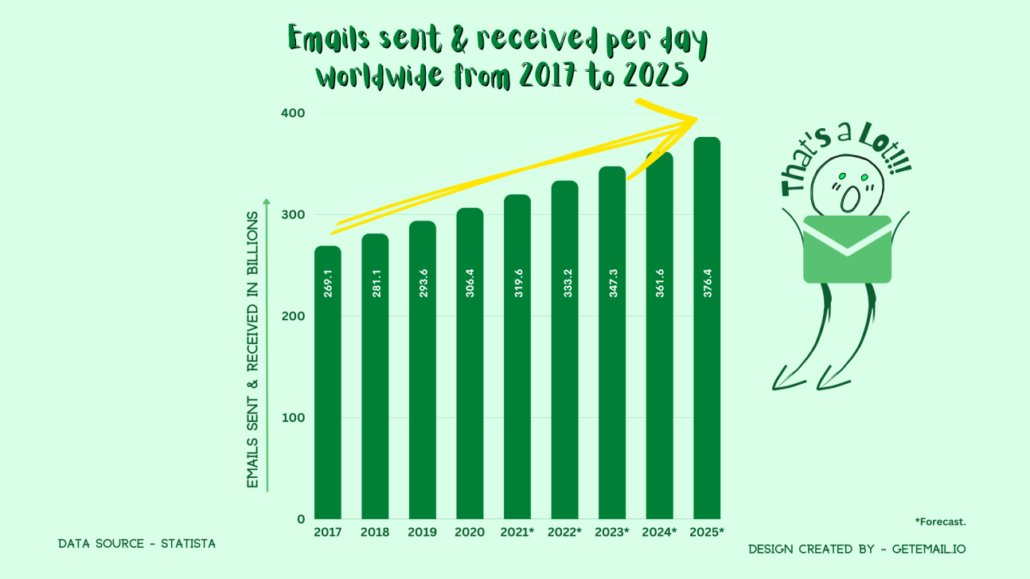
In 2021, it was anticipated that people all around the world sent and received 319.6 billion emails each and every day. By the year 2025, it is projected that the number of emails sent each day will reach 376.4 billion.
That’s a lot, right?
As you can see, despite the growing popularity of instant messengers, chat apps, and social media, email remains the primary digital communication medium.
A Glimpse of the Email Usage in United States
- If your target audience is the US (United States) market, then it is essential that you have a good understanding of how email is being used by the people in United States.
As of January 2022, 92% of the digital population in the United States reported utilizing email for communication.
On the other hand, just 83% of them utilized social media, and only 67% made use of other messaging applications. - In the United States, the usage of emails for work was highest among users aged 25 to 56 years old, while just 53% of Gen Z users utilized emails to exchange information and communicate at work.
- Approximately six in ten US (United States) millennials reported using emails for shopping, whereas talking with family and friends was identified as the primary activity for users in the quiet Generation, defined as those aged 76 to 93.
- People over the age of 45 constituted a sizable proportion of email news readers.
- 6% of users between the ages of 35 and 44 indicated that email was their primary method of internet news access.
- Customers who did most of their shopping online were the most inclined to open emails that provided information about promotions and discounts.
- Only 20% of consumers stated they opened email inquiries to review products they had recently purchased online.
- According to a poll done in February 2022, hybrid workers received 31 emails per week, whereas fully remote workers received 170 emails per week, this is almost six times more than that of hybrid workers.
- Between 2016 and 2020, American users spend more time checking work emails than personal emails; however, in 2021, users spent more than 172 minutes (about 3 hours) each day monitoring personal communications and only about 149 minutes (about 2 and a half hours) reviewing work emails.
- In 2020, when the global spread of the COVID 19 pandemic made workers rely more on digital tools for work communication, users spent about 200 minutes on work emails, which is about 3 and a half hours.
- Email was the primary form of communication utilized by 41% of employees in the United States who belonged to the Millennial generation and by 35% of employees who were a part of the Gen Z generation.
- In a study conducted online in July 2019 among white-collar employees in the United States who had a smart phone, 43% of workers claimed that they checked their business emails every few hours outside of their regular work hours, while just 10% stated that they checked continuously.
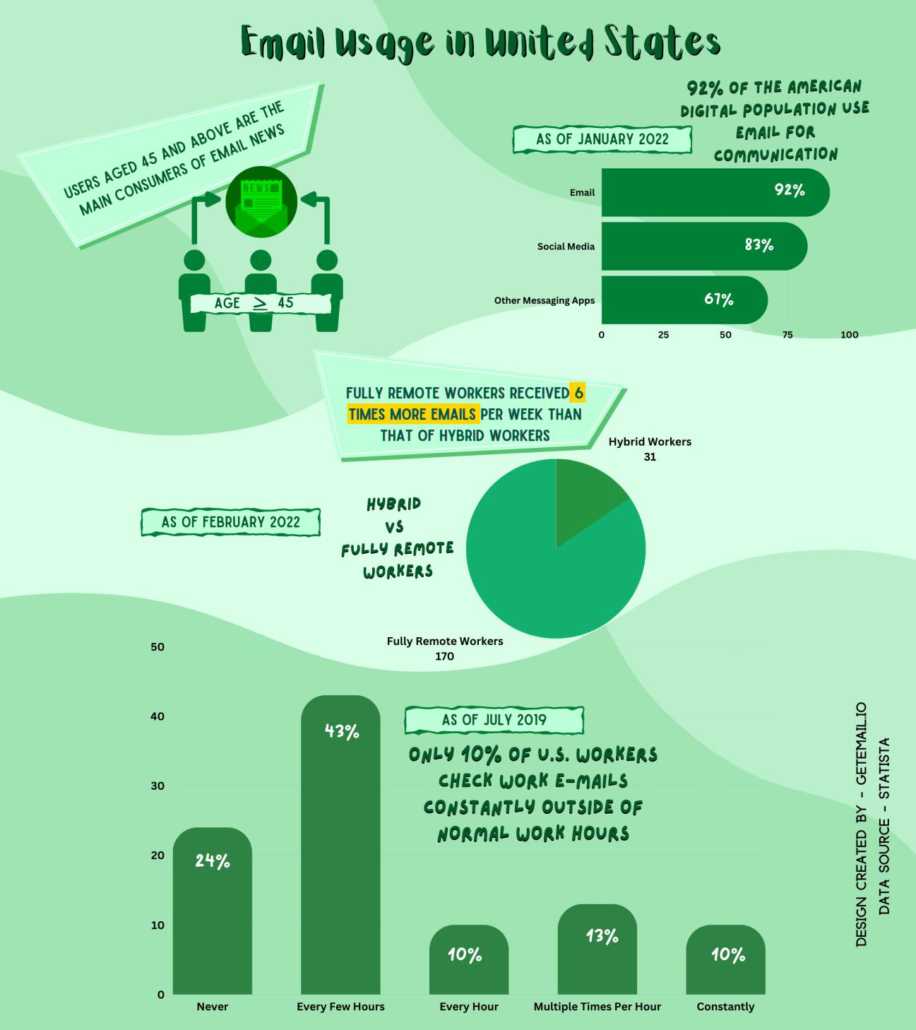
The metric discussed in this section will help in understanding how your email subscribers in the US market would respond to your brand emails.
So, there you go, plan your email marketing campaigns accordingly!
Pro tip: How to get an email address using an email search tool?
GetEmail.io is an email search tool ideal for finding professional email addresses. It just takes you a few seconds to get an email address.
It operates based on the artificial intelligence algorithm and therefore ensures a high accuracy rate.
If you wish to obtain email addresses from LinkedIn, all you need to do is download and install the GetEmail.io LinkedIn extension.
Then you can go to your LinkedIn page and open anyone’s profile you want to get an email address of. Just by clicking the get email button, you can have their email address. It’s very simple!
Likewise, you can find email addresses on Gmail/Salesforce/Outlook applications by installing the respective extensions.
A couple of months ago a feature was introduced, GetEmail.io extension popup, with this you can download the email addresses right from the prospect’s company website.
This is a very interesting feature and saves a lot of time.
Give it a try by signing up for the freemium package.
I hope this helped you. Now let us continue with the email marketing stats.
How Long Do People Read Brand Emails on Average?
People are devoting less time to email reading!
Have you ever wondered how much time your recipients spend on your emails?
It is noted that the average time people spend on reading your (brand) emails has dropped to 10 seconds in 2021.
It sounds astounding, right?
From 2011 to 2021, the maximum time spend was in the year 2018, where people on an average have spent around 13.4 seconds reading brand emails.

What does this stat imply?
You have around 10 sec to tell people your message. That’s it.
Therefore, it is important that you craft your emails in a way that it does not take any of your recipients time for more than ten seconds to read and perceive what you intend to say.
Now, all you got is 10 sec, let us see how you can make the most of it.
How to Convey Your Message to Your Email Recipients in 10 Seconds?
With great email design, you may not only deliver your message but also compel your receivers to take action.
Frame your email in a way that it is attention grabbing by using images and relevant call to action, enticing to read by proper use of typeface and spacing, evoke reader’s emotions, last but not least reflect and reinforce your brand.

While these are just a few things to bear in mind, you can always try and test different ideas to see what works best for you and your potential audience.
There are many marketers who still send their customers lengthy emails and it turns out to do well.
In their cases it was their content that worked amazingly. May be in 10 seconds they were able to hook their customers.
They send highly engaging, personalized content offering true values to the readers that the recipients had no choice but to stick with it till the end of the message.
So, if you start empathizing with your target audience, all that you do will be bent towards serving them better and naturally your customers will be inclined to your brand.
The Power of Personalization: Stats to Prove
Personalization is nothing more than a one-to-one approach, in which businesses use the real-time data and insights provided by their users to communicate with them in a more meaningful way.
The days of treating all your target customers as if they were part of a single, homogenous group are long gone. (Yes, we are talking about segmentation!)
Personalization will continue to gain steam because of the ever-increasing need among consumers for marketing content that is relevant to their specific needs.
Across the globe, both business-to-business and business-to-consumer marketers have grown to rely more on the power of personalization in their campaigns.
- In the year 2020, it was anticipated that by the year 2026, the worldwide revenue of the customer experience personalization and optimization software and service company will have grown by 65% in comparison to what it was in the year 2021.

- 30 % of the marketers said that they had begun to tailor the experience they provided for their clients as early as 2022.
- According to a study that was carried out in the year 2022, 60 % of the online buyers who were questioned claimed that firms that delivered material that was not individualized would lose their loyalty.
The fact that consumers are constantly bombarded with marketing messages that are irrelevant to them explains why they anticipate having a tailored experience.
Is your email marketing plan tailored to each of your customers or segmented groups? In the event that this is not the case, what steps can you take to add customization into your efforts to market via email?
According to the data depicted above, it was anticipated that the revenue generated by customer experience personalization and optimization would amount to 7.6 billion US dollars in 2021. Furthermore, it was anticipated that this figure would rise to 11.6 billion US dollars by 2026.
Therefore, making use of artificial intelligence is one approach to offer better experience for the potential clients you have. This guarantees an elevated level of customization.
Here is a stat to support this tactic.
- According to the findings of the study that was conducted in February 2018, responding marketers who were utilizing artificial intelligence for email customization recorded an AOV (Average Order Value) of 145 US dollars. This figure is seven dollars more than the AOV recorded by responding marketers who were not utilizing artificial intelligence in their campaigns. [Source: Statista]
Challenges in Email Marketing
While it is crucial to be abreast of what is new in email marketing and what the future holds, it is just as crucial to be aware of the obstacles others in your industry or niche face and the strategies they employ to overcome them.
Here is a stat obtained from a worldwide survey conducted in December 2020:
- 22% of responding marketers claimed that the most challenging goal to attain while optimizing an email marketing plan was mobile optimization;
- And the most mentioned problem was maintaining an engaged list, which was mentioned by 45% of marketers surveyed.
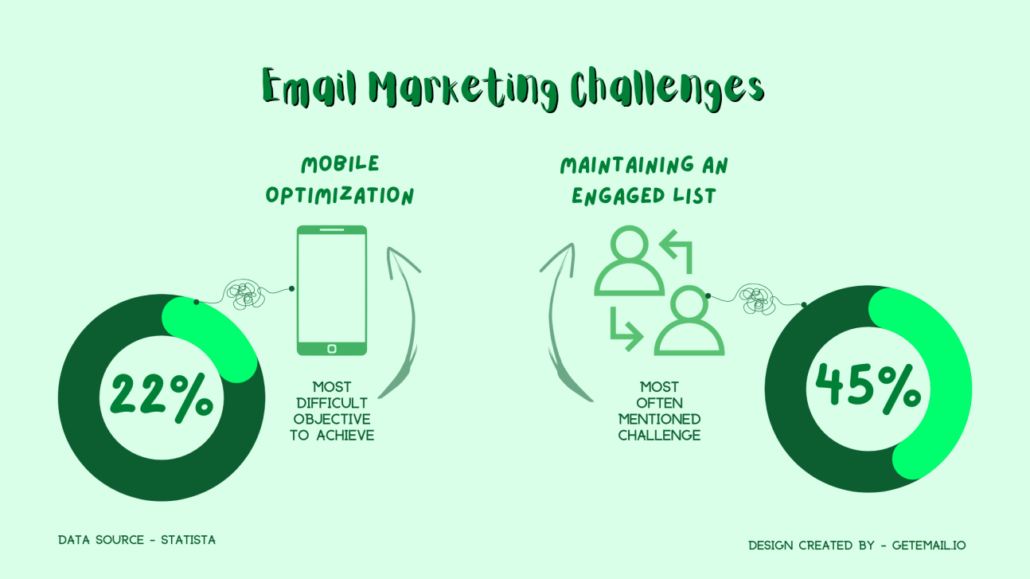
With over eighty percent of users preferring to read emails over their mobile devices, it is essential that you apply responsive design principles that make your emails look great on any device.
Here are some tips you could follow to optimize your email campaigns for mobile devices:
- Stick to a single column layout. This makes your content most readable for mobile devices. Having multiple column layouts is quite difficult to implement for mobile Gmail apps and outlook application;
- Be selective about adding links to elements. By doing so, you can make sure that not everything on the screen is clickable. Otherwise, each time the user scrolls to read further, it can lead to mis-clicks;
- Use legible font size. To make your content readable at a typical viewing distance without zooming, you could use a 14px font size for your email body copy, or at least it should 11 points.
- Provide sufficient touch targets for interactive components. According to apple developers, it is recommended to have a tappable area of at least 44*44 points for all controls.
- Add enough padding between elements. When you give enough spacing between elements, you can avoid accidental taps for your users.
- Less is more when you use typefaces. Do not mix too many typefaces, otherwise you will end up hindering the readability of your content.
Do you find these tips helpful?
These are a few recommendations; you could always conduct research on optimizing email campaigns for mobile devices and you will be surprised to see the many ways out there for you to try.
Now let us discuss the ways to maintain an engaged list.
When it comes to maintaining an email list, the value they get from you is the key.
You should consistently provide content or offers that are valuable to your customers and never fail to execute this.
Everything you do should be following this one thing, and you will start noticing improvement in your engaging list retention.
And the next thing you can do is to have a healthy email list.
Healthy email list is the one where you have only the right people and right email addresses in your database.
With GetEmail.io, the email search tool, you can also verify your email list. Yes, it is an email verifier too. You can instantly validate more than 1000 email addresses, thanks to its robust CSV features.
Concluding Thoughts
That is a wrap for my round up of email marketing statistics.
The figures presented above make it quite evident that engaging in email marketing is a fantastic opportunity that you should not be missing.
I hope you are convinced enough to reserve a sizable portion of your marketing budget for executing email marketing campaigns in 2023.
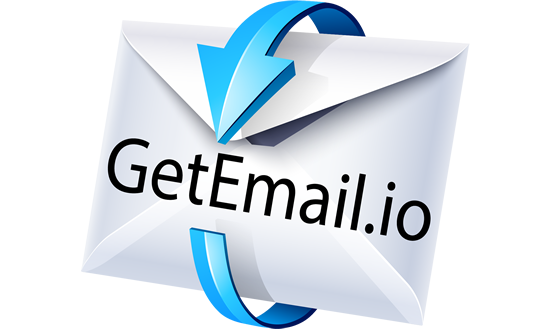




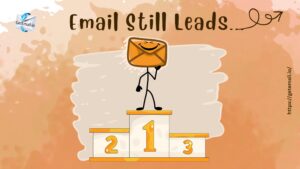

1 Comment
I will try to make progress